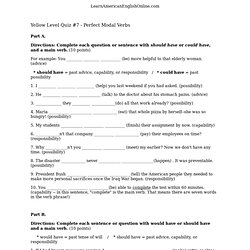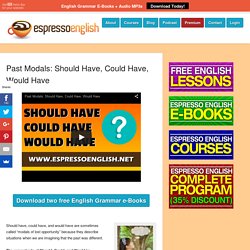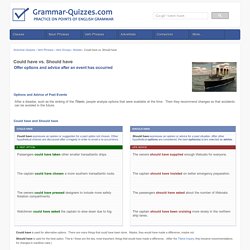

Yellow Level Quiz #7- perfect modal verbs. Part A.

Directions: Complete each question or sentence with should have or could have, and a main verb. (10 points) For example: You ________ ________ __________ (be) more helpful to that elderly woman. (advice) * should have = past advice, capability, or responsibility / * could have = past possibility. How to Use Should Have, Would Have, and Could Have. Past Modals: Should Have, Could Have, Would Have. Download two free English Grammar e-Books “Past modals” or “modals of lost opportunity” are used to imagine that the past was different.

(Image: Photokanok, FreeDigitalPhotos.net) Should have, could have, and would have are sometimes called “modals of lost opportunity” because they describe situations when we are imagining that the past was different. The general rule of Should, Could, and Would is: Should for recommendation / advice“If you want to lose weight, you should eat healthy food.”Could for possibilities“I have the day off tomorrow.”
Click here to review the difference between should, could, and would. The same general rule applies when using should have, could have, and would have for imaginary past situations. Should Have Use should have to say that a different action was recommended in the past. If you arrive late to English class, you can say: “I should have left my house earlier.” If you regret an argument, you can say: “I shouldn’t have yelled at you yesterday. Could have, would have, should have – modals of lost opportunity.
Modal 2 Quiz. Should have vs. Could have. Grammar-Quizzes › Verb Phrases › Verb Groups › Modals › Could have vs.

Should have Options and Advice of Past Events After a disaster, such as the sinking of the Titanic, people analyze options that were available at the time. Then they recommend changes so that accidents can be avoided in the future. Difference between Should, Could, and Would. The difference between should, could, and would is difficult for many English learners – this lesson will help you understand when to use each one!

Use SHOULD and SHOULDN’T for advice Here are some examples of using should and shouldn’t to ask for and give advice and suggestions: “I’ve had a really bad headache for the past week.” “That’s not good – you should go to the doctor.” “I want to make more friends, but I don’t know how.” “I had a fight with my best friend. Use COULD and COULDN’T for ability in the past Could and couldn’t are the past forms of can and can’t: When I was younger, I could run a mile in 7 minutes. Yesterday, I couldn’t find my wallet anywhere – but this morning I found it. Last year, he couldn’t speak English very well, but now he can. Use COULD for possibilities in the future Here’s an example of could to talk about future possibilities: “Do you have any ideas for our publicity campaign?” “Yes, I’ve got a few ideas. Regrets, criticism - should have, shouldn't have worksheet.
Should have, could have, would have.